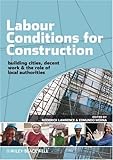| Title: | Labour Conditions for Construction: Decent Work, Building Cities and the Role of Local Authorities |
| Categories: | Construction |
| Authors: | Roderick Lawrence, Edmundo Werna |
| ISBN-10(13): | 1405189436 |
| Publisher: | Wiley-Blackwell |
| Publication date: | 2009-08-27 |
| Number of pages: | 312 |
| Language: | English |
| Picture: |

|
| Review: |
The book is an edited work based on a project funded by the Geneva International Academic Network and is an action-research project undertaken by the University of Geneva and the International Labour Organization. The book seeks 'to promote safe, healthy and non-exploitative working conditions for the construction industry'. It details the potential of local authorities to promote what the book calls decent work in construction and it seeks to answer questions such as what is decent work? Does it differ from a well-paid job or a safe working environment? Does it deal with conventional characteristics of employment in both the formal and the informal sector? And how can local authorities promote decent work? Local authorities are seen to play a major role in economic development and a basic tenet of the book is that this especially takes place through the policies and programs of the construction sector and related utilities, in particular water, sewerage and electricity. The focus is on developing countries since local authorities in such countries face the greatest challenges and problems. Construction is chosen since it is seen to have a major impact on urban development and the tackling of urban poverty. The book argues that the role of local authorities in promoting decent work has not received the attention it deserves. It incorporates both theoretical analysis and case studies and makes recommendations of best practice worldwide. The research project on which this book is based involves case studies of Bulawayo ( Zimbabwe), Dar es Salaam ( Tanzania) and Santo Andre ( Brazil). The book is divided into 7 chapters. Chapter 1 seeks to set the scene, presenting the concept of decent work and its origins and the framework by which the case studies will be undertaken, namely analysing the present situation in each city that has been selected, the national and local context, the situation with respect to employment and decent work and examples of good practice. Chapter 2 deals with the theme of decent work and is based on what it sees as the four key components of employment generation, social security, rights in the work place and social dialogue. Chapter 3 considers decent work from the point of view of urban areas, local authorities and construction. Chapter 4, 5 and 6 are devoted to the case studies of Bulawayo, Dar es Salaam and Santo Andre based on the framework developed in chapter 1. Finally, chapter 7 offers conclusions, recommendations and guidelines with respect to the promotion of decent work. This is an interesting, if somewhat ambitious book. The case studies are most informative dealing with cities which are not the easiest places from which to obtain data/information. The data is a little dated but that is to be expected. It is not entirely clear on what basis the 3 case study cities were chosen. This book is worthwhile for both academics and practitioners with an interest in the construction sector, developing countries and the notion of decent work. In many countries, and especially developing countries, the problem of unemployment and what the book calls 'human vulnerability' is increasingly important. As such the concept of decent work all important, with local authorities being the basis for the promotion of decent work. Overall, a most interesting read. Professor Steve Ison Loughborough University |



